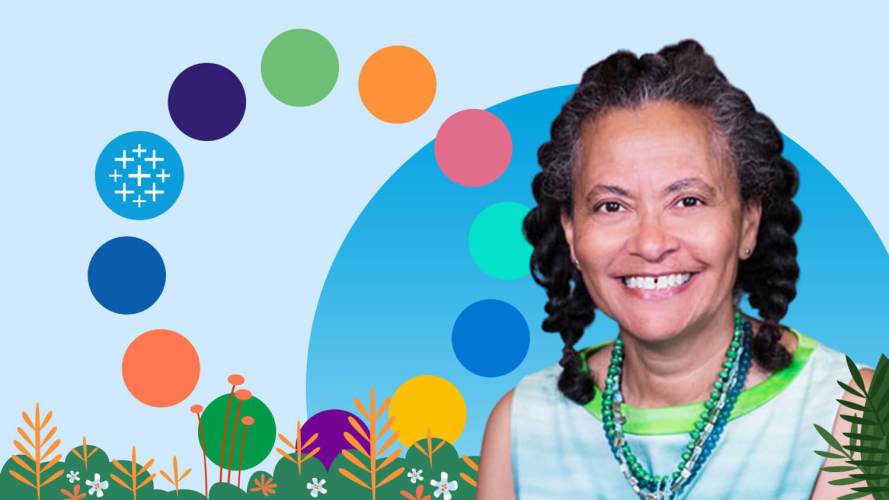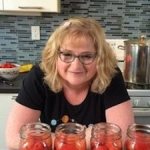Back in May of 2020, we spoke with family physician, epidemiologist, and antiracism activist Dr. Camara Jones about the disproportionate impact of COVID-19 on the Black community. We were so taken with her factual insights and her work “naming, measuring, and addressing” pandemic impact that we invited her back again in February 2021 to discuss what’s changed.
Salesforce Chief Philanthropy Officer, Ebony Beckwith, spoke with Dr. Jones about why the vaccine is important, as well as the necessity of continued public health interventions, such as personal protection (“masking up, washing up, and backing up”) and governmental support. She stressed the importance of answering people’s questions about the vaccine rather than simply dictating its necessity. And as she shares her own experience as a vaccine recipient. Dr. Jones detailed the science behind how the vaccines work, and she called for urgent attention to equity in vaccine distribution. If the vaccine is like a bullet-proof vest, she emphasized that we need to provide the vests first to those who are living or working most in the line of fire.
If you’ve watched this episode of Leading Through Change, or even if you haven’t, here are a few highlights from the episode:
Why is the COVID-19 vaccine so significant?
Think of it as a bulletproof vest. It’s not going to protect you 100%, but it is valuable protection. I’ve been thinking a lot lately from the point of view of the virus. It’s job is just to replicate itself no matter what, and that includes attacking any susceptible people. The vaccine keeps people from being susceptible. It’s a tool in our toolbox, along with the importance of sheltering in place and protecting workers. Both of these are at least equally as important as the vaccine. These public health measures help hide us from the virus. The vaccine makes us stronger to fight against it.
What are some important things to know about the science and efficacy of the vaccine?
First of all, none of the vaccines are introducing the coronavirus into our system; sometimes people get confused about that. Also, there’s not just one vaccine: there’s the Pfizer-BioNTech and the Moderna. (Editor’s note: since this interview, Johnson & Johnson’s Janssen vaccine was also introduced.) Both work the same way, and they offer 95% protection against getting very sick. The first dose helps our bodies recognize that we need to create a response right now – it’s like sending up a flare, and giving our bodies the initial recognition that we are going to need to respond. Then, three weeks later for the Pfizer-BioNTech, and four weeks later for the Moderna, we get the second dose to boost that.
Why do you believe the COVID vaccine is safe?
I’m not going to try to coax, cajole, or convince anybody to take it. I took it. I got my two doses. But I want to inform people, and I want them to ask me questions. We are self-determined people, and we should be able to get the information we need to make up our own minds.
The vaccine is not as new as people think. The technology has been around since SARS in 2003, which is also a coronavirus from the same family of viruses. People started developing these ideas a while back. As soon as the genetic code for the current virus was mapped last January, people started working on the vaccine.
The Pfizer-BioNTech vaccine had trials in 44,000 people, and the Moderna in 30,000. So far, the effectiveness has been amazing. We have not seen bad side effects, and my understanding of how it works makes me feel very confident we’re not set up for long term side effects. Sixty-four million Americans have been vaccinated with at least one shot (on the date this post was published) with no adverse effects – just a rare allergic reaction that can be treated immediately. COVID is much harder to treat.
How can we stop the misinformation about the pandemic in marginalized communities?
Instead of focusing on vaccine hesitancy, let’s answer people’s questions. Let’s make sure that we put the vaccine near the people who are most affected so that when they make up their mind, they can easily get it. Don’t make them figure out how they’re going to make an appointment, or how they’re going to get 30 miles out to a stadium. I would rather focus our attention on answering people’s questions. We need to assure that the vaccine is going to the most affected communities first. That’s what equity is about.
This post is an installment of Leading Through Change, our video conversation series with industry and thought leaders who use Salesforce products to transform the way they work.



























